Europe has entered a “battle of narratives” with competitors that do not adhere to liberal democratic values, according to EU vice president Maroš Šefčovič. “The time that liberal democracy is the standard model is over.”
The European Commission last week published the latest edition of its Strategic Foresight Report which seeks to “mainstream” such thinking into European policymaking as a way to prepare for change and help Europe become more “resilient” in the face of foreign competition.
The Commission foresees a “battle of offers” as Europe and the U.S. jostle with Beijing to lure developing nations over to their side, POLITICO adds. The key takeaway is that the old model of globalization — built on free trade and global supply chains — is gone. Instead, we’re entering a new era of “geoeconomics.” In a nutshell, that means Europe must cut back its strategic dependencies on other countries and instead tap its domestic resources and boost production on the Continent.
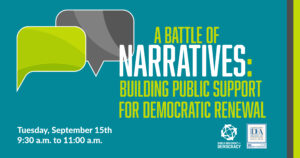
Authoritarian states are also on the offensive within the world’s multilateral institutions, and it is time to play more than just defense against them, argues Dr. Rana Siu Inboden, a senior fellow with the Robert S. Strauss Center for International Security and Law at The University of Texas at Austin.
This network of States is working to roll back democratic and human rights principles at the United Nations, affiliated bodies like the World Health Organization, crucial intergovernmental agencies such as Interpol, and regional groupings including the Organization for Security and Cooperation in Europe (OSCE), she writes in Going on Offense Against Authoritarians at the UN Human Rights Council and Beyond, an article for Just Security.
Using their seats on the U.N. Human Rights Council (UNHRC) in particular, repressive governments have attempted to undermine mechanisms that are meant to ensure accountability for rights abuses. Working off a shared playbook, they are hijacking the international human rights system and transforming the Council itself into a forum for mutual praise and anemic dialogue, she writes in an excerpt from a newly released report, “Defending the Global Human Rights System from Authoritarian Assault: How Democracies Can Retake the Initiative,” published by the International Forum for Democratic Studies at the National Endowment for Democracy (NED).
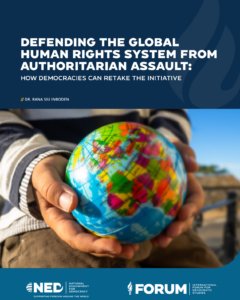
A coordinated, more purposeful democratic agenda to preserve and ultimately strengthen the institutions like the Council is needed, Inboden suggests:
- Leave no election uncontested. China and Russia’s efforts are aided by the strong presence of other authoritarian member states on the Council. Countries with a proven commitment to democracy should be encouraged to run as often as they can so that the ballot always features candidates with strong human rights records. Democratic States should coordinate and plan several cycles ahead to take advantage of key elections and commit to campaign for one another, such as elections that fill roles on human rights treaty bodies and Special Procedure openings.
- Attract a more diverse, cross-regional range of partners. Democracies should cultivate diverse coalitions – beyond existing ones among advanced, Western democracies – dedicated to issues that are of interest to developing nations within the LMG, such as racism, inequality, and climate change. This would counteract efforts by Beijing and its authoritarian partners to create divisions between wealthier democracies and the developing world, and it would discredit LMG arguments about Western “human rights imperialism.”
- Mobilize transnational civil society networks to drive a democratic agenda. Civil society activists and human rights organizations from the developing world should be engaged directly, and democratic governments should invest resources to build the capacity and expertise of such partners, enabling them to track and report on authoritarian influence within the global human rights system and develop innovative responses, and to hold their own governments accountable.
- Develop new tools to document and expose authoritarian attacks on accountability mechanisms. Given the ways in which repressive governments have worked to shield one another from existing human rights mechanisms, States that are committed to upholding human rights should develop and deploy new monitoring tools that can put a spotlight on efforts to evade accountability. A similar reporting mechanism could be dedicated to the recent upsurge in incidents of transnational repression, a new method authoritarian leaders use to silence opponents and deter opposition to their goals in multilateral fora.
The U.N. human rights system is worth defending because of the moral weight it carries, the accountability it can often provide for repressive governments, and its ability to inspire local activists, adds Inboden, author of China and the International Human Rights Regime. Defending the system in practice, though, requires a far more assertive and fresh strategy. RTWT
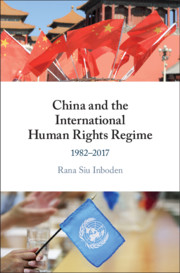
‘Xivilization‘?
Traditional Chinese culture has made a comeback amid rising nationalism as Beijing and Washington are mired in intense strategic competition, The SCMP reports. China’s President Xi Xinping speaks of ‘common aspirations’, rather than human rights of ‘peace, development, equity, justice, democracy and freedom, adding that cultural inheritance, innovation and development remained key factors for China to grow into a global cultural powerhouse.
Xi said the ruling Communist Party would “develop a modern Chinese civilisation, keep promoting exchanges and mutual learning among civilisations, and provide cultural strength for building a stronger country and achieving national rejuvenation”.
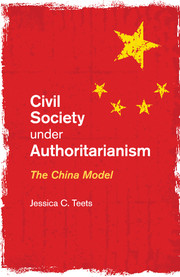
Ideological legitimacy
“Xi has been making an effort to reconstitute the party’s ideology system by combining Marxism with traditional Chinese culture,” said Chen Daoyin, an independent political scientist and former Shanghai-based professor. “With this landmark project, Xi tries to increase people’s sense of identity, improve their recognition of [the] ‘Chinese dream’ and [the world as] ‘a community of shared destiny for mankind’, and defend the ideological legitimacy of the party,” Chen added.
“Cultural security concerns the ability for a culture to survive, develop and keep safe. Culture is the soul of a nation and crucial to social stability, a country’s soft power and the discourse competition in global affairs,” wrote Yan Xu, a scholar with the China People’s Liberation Army National Defence University.
It was a real pleasure to moderate a discussion with top experts Rana Siu Inboden, whose excellent report is being launched, and @SophieHRW on how democracies can more effectively compete to retake the initiative in the global human rights system https://t.co/1pCWw0trD7 pic.twitter.com/WwLt4Sx2k3
— Christopher Walker (@Walker_CT) July 10, 2023
The Biden administration’s labelling of China as a strategic competitor suggests competition for the reputation and benefits of one political system over another, notes analyst Stephanie Christine Winkler. For this reason, it has become essential for the USA to “prove democracy works.”
Internationally, it has frequently emphasized the democratic values shared with its partners in juxtaposition with China’s authoritarianism, she writes for The Chinese Journal of International Politics. For instance, the purpose of Biden’s first trip to Europe was “America rallying the world’s democracies,” while the “summit of democracies” was intended to “renew the spirit and shared purpose of the nations of the free world.” Especially since the outbreak of the Ukraine War, the USA has repeatedly emphasized the inherent conflict between authoritarian, rule-breaking states such as Russia–China and the democratic states that support the liberal international order.
As authoritarian capitalism gains credibility, free societies must overcome their internal weaknesses, the Atlantic Council’s Matthew Kroenig and Danielle Miller write for Foreign Policy.
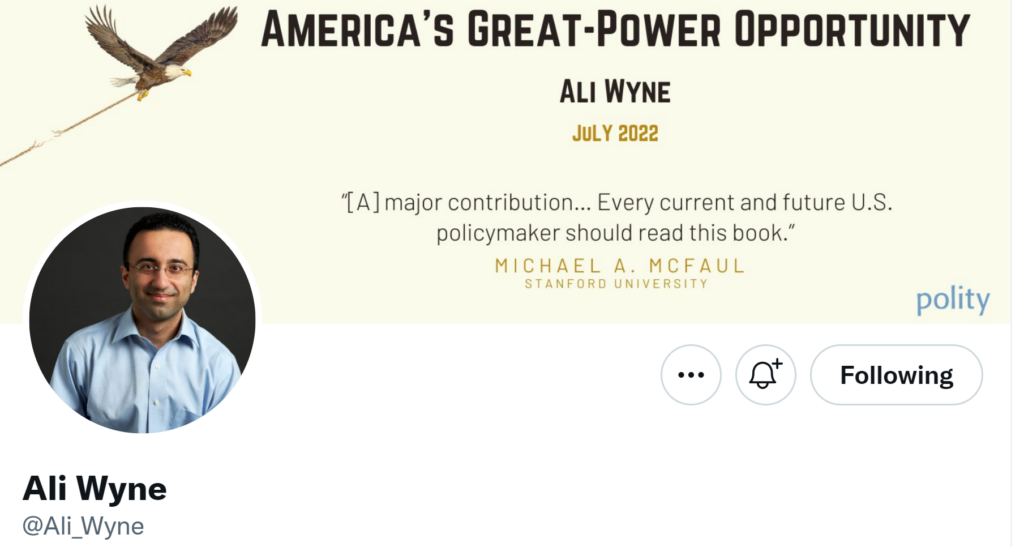 Ali Wyne argues that America’s Great-Power Opportunity is to move beyond strategic reflexiveness toward its two Great Power rivals while reaffirming America’s global democratic example and evolving the present global order with greater ownership and participation from allies and partners, notes Thomas F. Lynch III, a Distinguished Research Fellow in the the National Defense University’s Center for Strategic Research:
Ali Wyne argues that America’s Great-Power Opportunity is to move beyond strategic reflexiveness toward its two Great Power rivals while reaffirming America’s global democratic example and evolving the present global order with greater ownership and participation from allies and partners, notes Thomas F. Lynch III, a Distinguished Research Fellow in the the National Defense University’s Center for Strategic Research:
Wyne mostly accepts that the December 2017 National Security Strategy of the United States of America got it right when it advanced GPC as the new geostrategic reality, supplanting over three decades of American strategic focus on engaging the world for the purpose of enlarging the zone of liberal democratic states….. He argues for Washington first to shore up its own longstanding competitive advantages in technological innovation, finance, and entrepreneurship as a haven for ambitious immigrants and as a beacon of democracy.
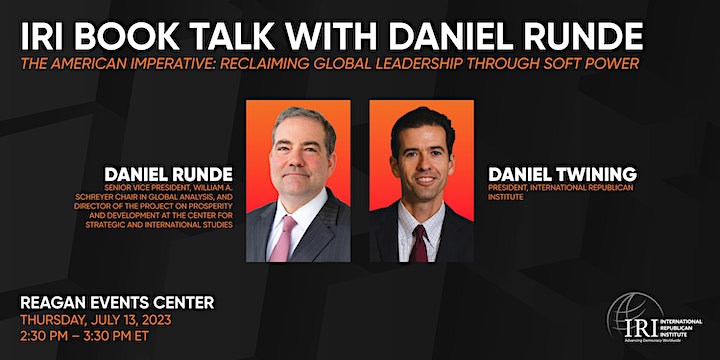 Great power competition will not be fought in Beijing or Moscow, notes the International Republican Institute, rather it will be contested in Ukraine, Africa, Southeast Asia, and Latin America, CSIS analyst Daniel Runde contends in his book, The American Imperative: Reclaiming Global Leadership through Soft Power. In a forthcoming conversation with IRI’s Daniel Twining, Runde makes the case for renewed American engagement in the developing world for our own prosperity and security, but also because foreign assistance and other forms of soft power are largely where this competition is going to be contested.
Great power competition will not be fought in Beijing or Moscow, notes the International Republican Institute, rather it will be contested in Ukraine, Africa, Southeast Asia, and Latin America, CSIS analyst Daniel Runde contends in his book, The American Imperative: Reclaiming Global Leadership through Soft Power. In a forthcoming conversation with IRI’s Daniel Twining, Runde makes the case for renewed American engagement in the developing world for our own prosperity and security, but also because foreign assistance and other forms of soft power are largely where this competition is going to be contested.
Thursday, July 13, 2023 from 2:30 PM to 3:30 PM ET RSVP

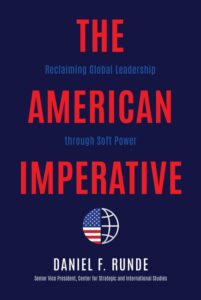 Fully harnessing the potential of US foreign aid in this struggle requires fundamental reforms to the congressional processes involved in overseeing aid allocations and earmarks; reforms to bureaucratic agencies tasked with spending foreign aid; improvements to US modes for delivering this assistance; and a narrowing of scope to areas most critical for advancing US interests,
Fully harnessing the potential of US foreign aid in this struggle requires fundamental reforms to the congressional processes involved in overseeing aid allocations and earmarks; reforms to bureaucratic agencies tasked with spending foreign aid; improvements to US modes for delivering this assistance; and a narrowing of scope to areas most critical for advancing US interests, 





